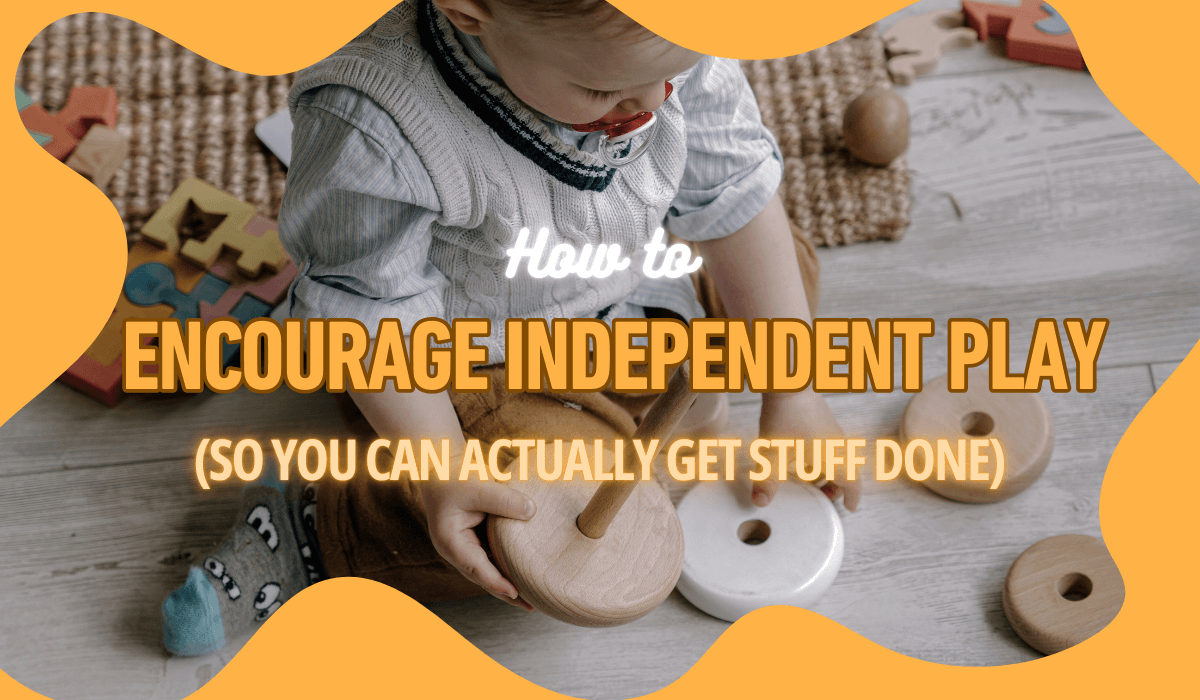The Struggle is Real: When Your Toddler Needs Constant Attention (and You Need a Break)
Picture this: You're trying to make lunch, answer an email, or, heaven forbid, pee alone for five minutes—and suddenly, your toddler is attached to your leg like a koala on steroids. They need you for everything—even if that "everything" is just to watch them color a page for the 32nd time.
Sound familiar? As a mom, I get it. The constant need for attention, for play, for cuddles—it can feel like you’re stuck in a never-ending cycle of child-centered chaos. But here's the kicker: Your toddler doesn't need to be entertained 24/7, and you don’t need to feel guilty for stepping back and letting them learn to play independently. In fact, encouraging independent play is one of the best things you can do for both of you. ✨
Why Independent Play is a Game Changer for Both You and Your Toddler
1. It Builds Confidence
When toddlers engage in solo play, they learn to problem-solve, be creative, and trust their own abilities. It’s like giving them a mini-self-esteem boost every time they figure something out on their own. Plus, it gives them the freedom to explore their world at their own pace. 🚀
2. It Strengthens Imagination
Solo play lets them create entire worlds with their toys (the block tower that’s also a rocket ship, anyone?). That imaginative thinking is essential for their cognitive development and will eventually make them awesome at coming up with stories... and maybe even coming up with their own solutions when they inevitably ask for help. 😂
3. It Gives You a Break (Finally!)
Let’s be real, you deserve a breather. Encouraging independent play gives you a chance to catch up on your to-do list, get some work done, or simply have a moment to breathe without being glued to your toddler's side. And yes, it’s okay to enjoy that break. 🙌
How to Encourage Independent Play Without Feeling Like a Bad Mom
We’ve all been there—feeling guilty because we want to step back for five minutes while our toddler does their thing. But here's the thing: Independent play isn’t neglecting your child. It's teaching them a valuable skill that will serve them for the rest of their life. And, bonus, it’ll help you keep your sanity.
So, here’s how to encourage your little one to start playing solo while you’re still within shouting distance.
✨ 1. Set Up a Play Space
Make sure there’s a safe, designated area where your toddler can go wild with their toys. A little “play zone” with age-appropriate toys will make it easy for them to focus on what they’re doing, and you'll feel a lot more relaxed knowing they’re safe and happy. Bonus points if you let them help choose the toys! (Just be ready to have three trucks and one dinosaur in their hands at all times. 🦖)
🕒 2. Start Small with Short Sessions
At first, independent play might last only a few minutes before they’re calling your name for the 14th time. That’s normal! Start with short sessions—just five to ten minutes—and gradually extend the time as they get more comfortable playing solo. Just like with anything, practice makes perfect. And for the record, your toddler’s attention span probably lasts as long as it takes for you to find the elusive “missing sock” in the laundry pile.
🎵 3. Set the Mood with Music or White Noise
Create an environment where your toddler feels comfortable and engaged. Play some calming background music or use a white noise machine (I swear by this!) to make them feel cozy and focused. Sometimes all it takes is a little ambiance to help them settle into play mode. 🕯️
💡 4. Model Play Yourself
Toddlers are watchers. They learn by mimicking what they see. So, show them how it’s done! Sit down with a book or do a quiet activity nearby while they play. Occasionally glance at them with a smile and a “Wow, look at what you built!” This shows them it’s okay to play independently while also feeling your support. If you don’t have time to do your own thing, you can still "play" by pretending to tidy up, working on a hobby, or reading. They'll catch on. 😎
🙌 5. Create a Routine
Consistency is key! Make independent play a part of your daily routine. Maybe after breakfast, it’s playtime before going for a walk or running errands. Toddlers love routines, so the more they know when to expect playtime on their own, the easier it will be for them to get into it. Think of it as a mini break—for both of you.
Don’t Stress: Independent Play Will Benefit You Both in the Long Run
It might take a little time for your toddler to get the hang of playing independently, but once they do, you’ll see huge benefits—for both of you. You’ll feel less stressed, they’ll develop important skills, and you’ll both be able to enjoy your time together even more. Remember, it’s okay to want your own space while still being there for them. 🤗
Final Thoughts: You Got This, Mama!
At the end of the day, we’re all just trying to do our best. And while it’s super tempting to hover over your toddler during every moment of play, remember that a little independent playtime will work wonders for their development—and for your sanity.
So go ahead, step back a little, and let them dive into their imaginative world. You’ve got this. 💪


